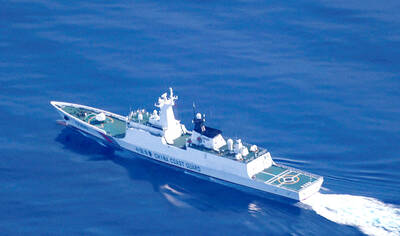One of the US’ most prominent TV anchors, Brian Williams, faced calls for his resignation on Friday for embellishing an Iraq war story from 2003.
Williams, 55, who reportedly earns US$10 million a year and is watched by an estimated 9 million US residents per episode, admitted that a story he had often repeated on air about coming under attack during a helicopter rise was not true.
“I made a mistake in recalling the events of 12 years ago,” Williams said in an apology broadcast live on Wednesday last week during the NBC Nightly News program that he hosts each evening. “I want to apologize. I said I was traveling in an aircraft that was hit by RPG fire. I was instead in a following aircraft.”
He apologized to colleagues again on Friday morning, according to a leaked memo purportedly from NBC News president Deborah Turness.
The memo said that NBC has appointed a team to investigate the facts and “help us make sense of all that has transpired.”
On Facebook, Williams said that he had “conflated” the two events, which happened while he was covering the US invasion of Iraq.
A hugely respected journalist in the US, he has anchored NBC Nightly News since 2004.
A former chief White House correspondent, Williams was celebrated for his coverage of Hurricane Katrina in 2005 and has collected more than two dozen industry awards.
The false tale dates back at least to an interview with US chat show king David Letterman in 2013.
At the time of the incident in 2003, Williams said that it was the Chinook ahead that was “almost blown out of the sky.”
He repeated the story on television as recently as Jan. 30, in an elaborate tribute to a retired soldier who helped provide ground security for the grounded aircraft and crew.
However, crew members of the Chinook helicopter and Williams’ aircraft told Stars and Stripes, a US publication that covers the armed forces, that the anchor had been nowhere near the helicopter that was fired upon or other Chinooks in its formation.
He instead arrived later in a separate helicopter, which landed due to an oncoming sandstorm.

‘HYANGDO’: A South Korean lawmaker said there was no credible evidence to support rumors that Kim Jong-un has a son with a disability or who is studying abroad South Korea’s spy agency yesterday said that North Korean leader Kim Jong-un’s daughter, Kim Ju-ae, who last week accompanied him on a high-profile visit to Beijing, is understood to be his recognized successor. The teenager drew global attention when she made her first official overseas trip with her father, as he met with Chinese President Xi Jinping (習近平) and Russian President Vladimir Putin. Analysts have long seen her as Kim’s likely successor, although some have suggested she has an older brother who is being secretly groomed as the next leader. The South Korean National Intelligence Service (NIS) “assesses that she [Kim Ju-ae]

In the week before his fatal shooting, right-wing US political activist Charlie Kirk cheered the boom of conservative young men in South Korea and warned about a “globalist menace” in Tokyo on his first speaking tour of Asia. Kirk, 31, who helped amplify US President Donald Trump’s agenda to young voters with often inflammatory rhetoric focused on issues such as gender and immigration, was shot in the neck on Wednesday at a speaking event at a Utah university. In Seoul on Friday last week, he spoke about how he “brought Trump to victory,” while addressing Build Up Korea 2025, a conservative conference

China has approved the creation of a national nature reserve at the disputed Scarborough Shoal (Huangyan Island, 黃岩島), claimed by Taiwan and the Philippines, the government said yesterday, as Beijing moves to reinforce its territorial claims in the contested region. A notice posted online by the Chinese State Council said that details about the area and size of the project would be released separately by the Chinese National Forestry and Grassland Administration. “The building of the Huangyan Island National Nature Reserve is an important guarantee for maintaining the diversity, stability and sustainability of the natural ecosystem of Huangyan Island,” the notice said. Scarborough

DEADLOCK: Putin has vowed to continue fighting unless Ukraine cedes more land, while talks have been paused with no immediate results expected, the Kremlin said Russia on Friday said that peace talks with Kyiv were on “pause” as Ukrainian President Volodymyr Zelenskiy warned that Russian President Vladimir Putin still wanted to capture the whole of Ukraine. Meanwhile, US President Donald Trump said that he was running out of patience with Putin, and the NATO alliance said it would bolster its eastern front after Russian drones were shot down in Polish airspace this week. The latest blow to faltering diplomacy came as Russia’s army staged major military drills with its key ally Belarus. Despite Trump forcing the warring sides to hold direct talks and hosting Putin in Alaska, there